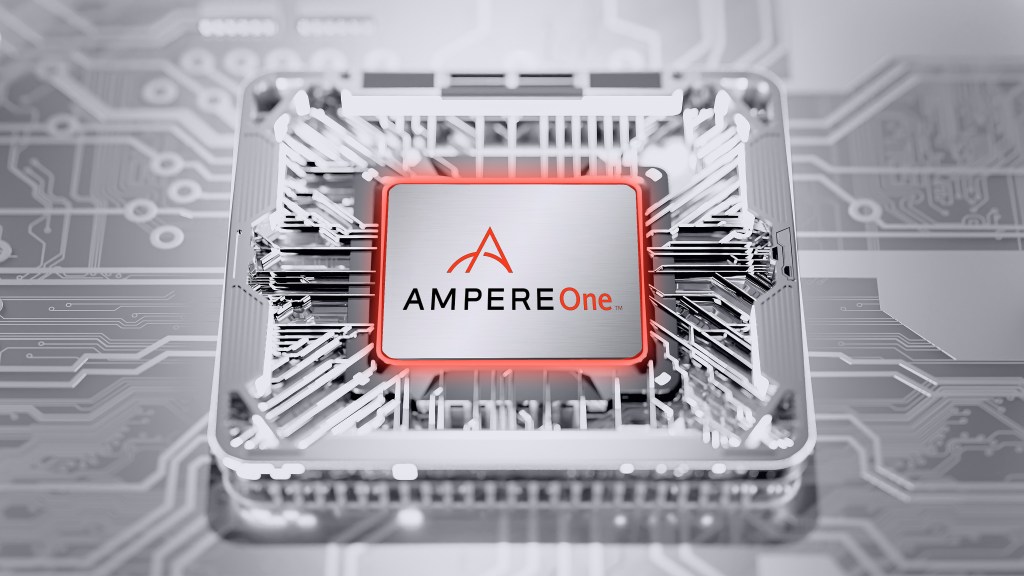Over the course of the last few years, thanks to its Altra and Altra Max processors, Ampere made a name for itself as one of the premier suppliers of Arm-based chips to large cloud services providers. These chips were also based on Arm-designed cores, though. Today, the company is officially launching the AmpereOne family, its first set of processors with custom-designed chips highly optimized for data center use cases.
While the Altra Max chips, which started shipping in 2021 were based on Arm’s Neoverse N1 architecture, these new cores were designed in-house and built on a 5nm process.
“It is time for us as an industry to meet the moment and embrace change. Our future growth as an industry depends on it,” Ampere CEO Renée James said. “The cloud has ushered in a whole new world and approach to software development. Isn’t it time for the microprocessor to do the same?”
These processors remain compatible with the Arm instruction set, so there’s nothing new developers have to do to support them, but more importantly, by designing its own cores, Ampere was able to optimize these processors for its core user base of large cloud platforms. The new AmpereOne chips can support up to 192 cores, a significant upgrade from the Altra Max chips’ maximum of 128. In the AmpereOne family, every core now also gets 2MB of L2 private cache (up from 1MB) and the company added several features that ensure that every core gets access to the same amount of memory bandwidth (or not, if that’s what the user desires) and provide more fine-grained power management, for example. There are also features like process aging monitoring, which helps these vendors better manage the lifecycle of the processor and monitor it for issues, as well as advanced droop detection and security features like memory tagging and single-key memory encryption.
The idea here is to build a chip that is custom-designed for the cloud. “Not only are we delivering a processor, that is high performance, low power, but it’s also one that’s uniquely well suited for the cloud. That’s why we call it the cloud native processor. We built it from the ground up for this use case,” Ampere CPO Jeff Wittich told me.
Ampere prepares to launch its first custom data center chips
As Wittich told me, the company increasingly hears from customers who are looking to reduce the carbon emissions from their data centers and manage their energy costs — a problem that’s especially acute for data center operators in the European Union. Ampere — and Arm’s server-centric chips — have long promised to offer more performance per kilowatt than the competition from Intel and AMD. Ampere now mostly describes this as performance per rack and argues that in its benchmark of running a typical web application, a rack of 36 Ampere CPUs provides the same performance as two racks of AMD Epyc CPUs and three racks of Intel Xeon CPUs. The company didn’t provide updated benchmarks for the AmpereOne processors, but Wittich argued that its performance per watt is comparable to the Altra family.
“Being able to go in and say: I can provide you a server that consumes half the power and deliver twice the performance of the alternative that’s a pretty easy sell for [OEMs] now,” Wittich told me. “Obviously, some people now understand the sustainability angle to it, too.” And even if sustainability is only a second-order problem for some data center operators, he noted, they are now increasingly limited by the power available to them in some metropolitan areas — plus, it’s getting harder to get new data centers approved, so many operators have to figure out ways to increase the performance within their existing physical footprint.
Current Ampere customers include the likes of Google Cloud, Microsoft Azure, Oracle Cloud, Alibaba and Tencent, as well as OEMs like HPE and Supermicro. It’s easy to spot the one large cloud provider that is missing from this list, but AWS has long bet on its own Graviton line of Arm-based chips, so that’s not likely to change anytime soon.
While Ampere will continue to offer its existing Altra family and has no plans to discontinue it, the company also won’t be launching any new chips in this range. “All of our future processors will rely on our own custom cores,” Wittich said. “The big thing about AmpereOne that makes so impactful is that this is the start of every one of our future products. We’ve got our custom cores out there now and that’s the basis for everything.”































Comment